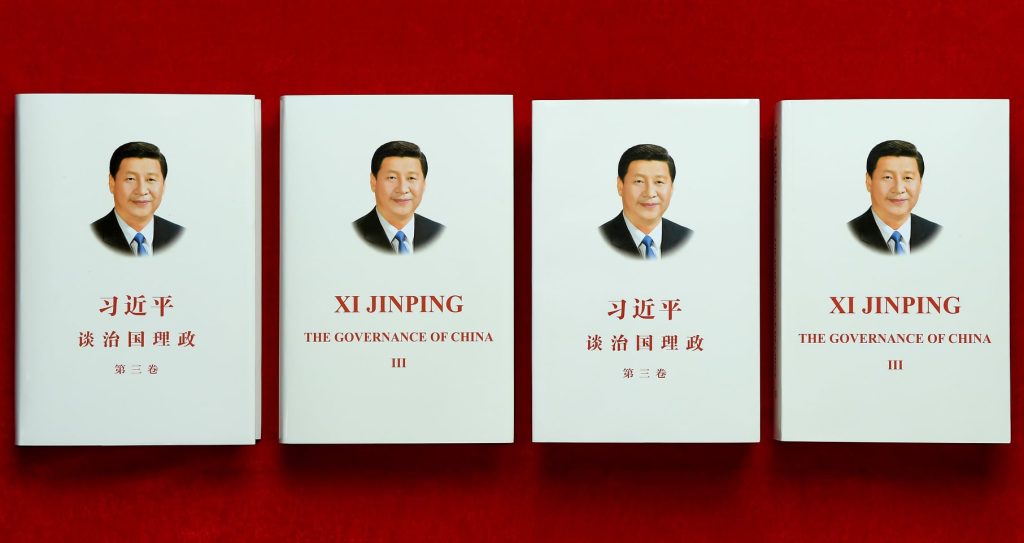
19.01.2021
Modern China attracts attention with its rapid development. In 2020, this country coped quite effectively with the COVID-19 pandemic and its heavy economic consequences. Last year, the PRC economy was the only one that showed positive development – it was +2.3% GDP growth against the background of a sharp decline of GDP in all major Western economies.
To understand why China is so actively developing, it is necessary to understand the fundamentals of governance that the fifth generation of Chinese leaders applies. These approaches are very succinctly described in the books of Chinese President Xi Jinping «The Governance of China».
To date, three volumes of this printed work have already been published (in 2014 in 2017, in 2020), which are of great interest both within China and abroad.
The third volume of the book differs in that if earlier Xi Jinping only expressed his vision of the future China, then in the third volume he already talks about the achievements of the development of his state. And he himself is the author and participant of many achievements and results of the development of the PRC over the past few years.
After the 19th Congress of the CPC, held in 2017, the General Secretary of the CPC Central Committee Xi Jinping got involved in practical leadership work, in fact, putting into practice the ideas of public administration in a new era for the PRC. In the process of this work, he made numerous proposals, expressed his position and opinions on the development of the state, which, according to Chinese experts, have enriched the treasury of the CCP’s modern party thought.
The third volume of Xi Jinping’s book «The Governance of China» covers the stage of the President of the People’s Republic of China from October 18, 2017 to January 13, 2020 and includes 92 articles on 19 different topics, as well as a selection of photos.
The new edition includes reports, speeches, speeches, instructions, instructions, and congratulatory letters that CCP General Secretary Xi Jinping sent or delivered during this period. They reflect the ideology of the Chinese leader and reveal the specifics of the current development of the PRC. In general, Xi Jinping’s recently released book complements the idea of the main ideological foundations of the domestic and foreign policy of the new generation of the PRC leadership.
The third volume of Xi Jinping’s book «The Governance of China» in broad strokes presents the essence of the modern practical work of the CPC Central Committee, the “core” of which is Xi Jinping. Thus, a study of Xi’s works will give an understanding of the essence of China’s political philosophy, in accordance with which this country is developing during its current revival and a consistent change in its status in the international arena.
The third book also has an ideological bias, in particular, it demonstrates the modern achievements of the Sinification of Marxism, that is, the enrichment of this teaching with modern Chinese experience. Xi Jinping’s book introduces readers to the views of the leader of China and allows them to gain a deeper understanding of the concept of Chinese statehood and the specifics of China’s political strategy.
The book puts forward theses on state and global governance in the indicated period, as well as Chinese options for solving urgent problems of mankind. Thus, it reveals the CCP’s vision of creating a community of common destiny for humanity, which, according to the Chinese leadership, may possibly become a unifying concept for the global world.
The new reality is that in a volatile international environment, China needs peace for its own prosperity, just as the world needs China for development and stability. Who is this country for the world community: a partner or a rival? What can China offer the world, which is dynamically developing and changing? The answers to these and many other questions are covered in the third book of Xi Jinping «The Governance of China».
China is well aware that global leadership, in addition to primacy in economics, technology and security guarantees, also requires a unifying concept. China also understands that the world needs openness and consistent information support for its actions.
Apparently, through his books, the PRC leader seeks to formulate such an ideological basis for his international activity and to offer the world community his vision of joint development. Most likely, this is why Xi’s works are actively translated into dozens of languages and widely distributed in different countries of the world.
Thus, the third edition in the trilogy «The Governance of China» positions its author as a progressive open Chinese leader of a new formation, who has a large-scale thinking and skillfully leads the second global economy.
The new book was published under the editorship of the Propaganda Department of the Central Committee of the CPC, the Institute for the Study of Party History and Documents under the Central Committee of the CPC and the PRC Administration for the Publishing and Distribution of Literature in Foreign Languages.
Given the current global status of the PRC, the publication will undoubtedly be useful not only for a narrow circle of specialists in Sinology (because today China has already become an important factor in international development), but also for everyone interested in contemporary international relations, politics and economics.
Gulnar Shaimergenova,
Director of China Studies Center in Kazakhstan,
Nur-Sultan city, Kazakhstan
Number of shows: 1989
